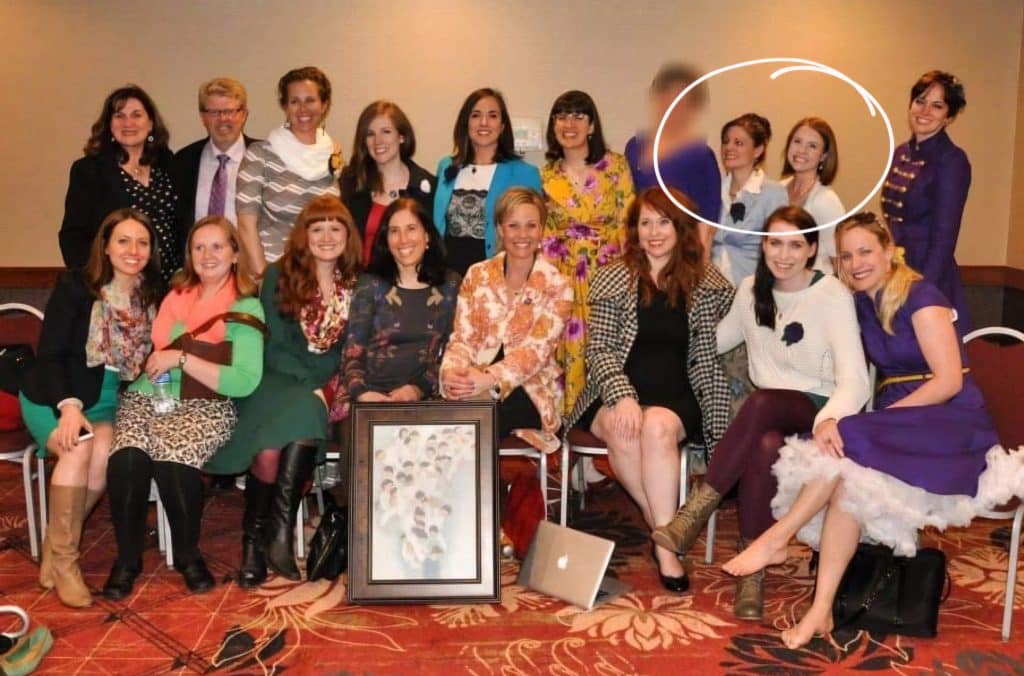Main Image: Bloggers April Young-Bennett and Abby Maxwell Hansen at an art installation in Salt Lake City celebrating women’s right to vote.
I first met April Young-Bennett, long time Exponent II blogger, in the fall of 2013 as the Ordain Women movement – asking for priesthood for Mormon women – hit international headlines and she was a vocal supporter of the movement. Still an active member of the church to this day, April has always believed her spiritual home should also have a place for her leadership skills. While I cherish the friendships of many women I’ve interacted with at Exponent II over the years, I especially love April for her unique ability to cut through nonsense and explain things in such clear terms that I wonder how I didn’t see it on my own in the first place.
If my memory serves correctly, I first met April in person one day when we dragged our combined seven small children to a venue at Thanksgiving Point in Lehi, Utah, and then to a McDonald’s with a play place for lunch. Meeting a real life Mormon feminist who thought women should be ordained felt wild. I am not exaggerating when I say I had never met anyone like this in my entire life in the church. Her point of view wasn’t just different, I had literally never even heard of it a few months before that.
When we met, I had recently submitted a profile to the Ordain Women site after what felt like the most intense (and relentless) spiritual prompting of my life. I was very active in my Utah County ward and posting my public agreement with this extremely controversial movement was terrifying. With one click of my computer mouse my body filled with a surge of terror and adrenaline that has never since been matched, not even when I almost bumped into a mama moose and her babies hiking a trail in the Utah mountains a couple years ago. Between a wild animal that could kill me and admitting out loud that I thought women should be ordained, my nervous system picked death by angry moose stomping as significantly less terrifying.

Some who know my story know that my priesthood leaders pushed back against my Ordain Women profile to the point of threatening my excommunication. This was an incredibly stressful period of my life.
My bishop would say things to me that I couldn’t come up with a way to argue, like when he asked me, “What would happen in the case of a divorced, bitter couple whose child needed to be baptized? They would fight over whether mom or dad would get to do the baptism. Can you imagine how difficult that would be for the child to have to choose?” I didn’t have a great answer. April said to me, “So because of one sticky situation that might happen, we should disenfranchise all women from all leadership and authority roles in the church forever?” And I thought, ‘Oh, yeah. That’s actually a dumb reason to not ordain women.’ Why did it sound like a reasonable enough problem with ordaining women when my bishop said it to me, though? Why did I not have the ability to recognize it for the weak argument that it was?
(EDITED TO ADD: April read this blog post and responded with an even better explanation of why this is not a real issue. She said, “I hadn’t remembered that conversation about your bishop and how he believed disfranchising women was the only way to resolve the problem of divorced parents bickering about who would baptize their child. Of course a man would believe that the best way to handle it would be to automatically side with the dad every time. Problem solved.
But coincidentally, I attended a baptism of a child with divorced parents just a couple weeks ago, and to be fair to both sides of the child’s family, the maternal grandfather performed the baptism while the dad performed the confirmation. How convenient that we do two ordinances in a row for the same child on the same day! No need to exclude either divorcee! If only we would ordain women, and then mom could have performed the baptism herself instead of substituting her father, and then the dad could have performed the baptism. Or vice versa.“)
BACK TO MY ORIGINAL BLOG POST:
I don’t know how to explain the psychology, I just know that it worked on me for many years. As a teenage girl or in my twenties something would feel off to me, but when I’d bravely ask a question out loud I’d get an answer that would semi-appease me (at least temporarily) and I’d set that issue on my shelf. As I got older and more experienced, I’d again ask questions when things felt wrong, and get similar answers. I eventually stopped accepting the reasons, but couldn’t figure out a way to push back on them. It was so incredibly hard to make logical arguments against authority figures who I believed had the backing of God.
But then I met April! And every time someone would explain a reason why things just had to be the way they were, she’d respond with the most brilliantly worded explanation of why that simply wasn’t the case.
During the spring 2014 general conference, I joined April and hundreds of other women to request entrance to the priesthood session on Temple Square (their second time, my first). Unlike how terrified my body had felt when posting my OW profile, my body now felt empowered as I stood up and asked to be heard by an institution that I loved and wanted to be recognized in.
As we stood outside in the pouring rain, Elder Oaks explained to the men inside of priesthood session that the women actually have the Priesthood already – and 184 years of rhetoric associating men and boys with the Priesthood turned on a dime.

As the years have passed, I’ve seen women in my life enthusiastically accept this new definition of priesthood power – the kind with no real job description other than it exists. The discussion has become how it’s actually our own shortcomings as members of the church for not understanding the temple endowment well enough to have figured this out on our own already. Leaders insist women don’t need to ask for the priesthood because we already have it – but they have changed the definition of priesthood. Instead of being the power to actually do anything in the church (bless, baptize, be a general authority, preside, be on a disciplinary council, play basketball at midnight in the cultural hall and not get kicked out), the definition of having the priesthood has become “existing as a member of the church”.
And everyone was like, “Ooohh, wow! Women are so empowered in this church! We do have priesthood power, just like the men. Everything we do is with priesthood power! In fact, there is no other religious organization in the world that has so broadly given power and authority to women!”
It’s like someone at work asking for a promotion and the boss telling them, “Sure, you’re the CEO now.” But when that employee asks for a raise, or to be invited into a high level meeting, or to make a decision about literally anything other than the exact same low level decisions they were already allowed to make before their promotion to “CEO”, they’re told absolutely not. This is exactly what telling women we have the priesthood ten years ago was like. Nothing has changed. When Anette Dennis’s Instagram blew up and made national news earlier this year, it was because she was essentially telling those frustrated employees, “But you are all CEOs of this company. I don’t know any other companies in the world that let all of the women be CEOs!”
Yesterday April published a new blog post titled “9 Barriers to Leadership for the 9 Women Leaders of the LDS Church“ and she continues to brilliantly point out in very clear terms why telling women we hold the priesthood is utterly meaningless if nothing else changes. We need more women like April to speak up and share why this change in vocabulary did not solve the issue of women’s inequality in the church.
Ten years ago, April was a strong voice of reason that gently pulled me away from the well-used neuropathways I’d been travelling inside my brain since birth. She helped me view my entire world differently. I eventually followed her path and also made myself a public voice here on the blog. If there’s one thing I consistently think about when I write, it’s how I can pay forward the gift that April (and so many other vocal Mormon feminists) once gave me.
The church itself is slightly different now than it was a decade ago when I posted my Ordain Women profile, but not much. What has been changing significantly is the women within it. The voices that call out the blatant sexism and inherent unfairness to girls and women are increasing. The altered definition of what it means to have priesthood power temporarily calmed the rising wave of voices asking for change, but there’s a tsunami coming. I know this deep in my bones because I’ve been immersed in the world of Mormon women for decades and found a new home and respite within Mormon feminism. This church has to change and include women with full equality in its power structure or it will die. It won’t matter how much wealth, authority or even genuine loving intentions the men in leadership have, when the women begin to leave this church will crumble.
And to any women inside the church reading these words and feeling lost and alone like I did in the fall of 2013 – you are not crazy, you are not alone, and I wish I could take you personally to a McDonald’s play place and validate everything you’re feeling while our kids eat chicken nuggets. This church does have major issues with gender inequality and you are not wrong for being uncomfortable with it. If you feel alone in your ward or family, know there are countless women waiting to be your friends here at Exponent II, and we’ve got you.
Here are April and I inside the Utah State capitol building just a few months ago on International Women’s Day, on a personal treasure hunt for the only two statues of women inside. This was almost ten years to the day we went to Temple Square together, and she’s been a supportive friend and constant voice of logic and reason for me ever since. If you ever feel like you need a measure of sanity, check out her years of excellent blog posts on this site.

***Register for Exponent’s in-person retreat in New Hampshire this fall and make new friends!***






6 Responses
This makes me want to hang out with you all!
I just watched your full video with my husband – is an early morning and we watched from our bed. When it was done, my 13 year old walked into our room, confused why we were watching TV before 7am. “What did you watch??” My husband responded immediately, “it’s a video about this cool woman who worked really hard to do the right thing.” I gave a couple more details, and it’s nothing new for my kid. We talk about gender issues at church all the time. I’m glad she doesn’t accept everything at church as perfect like I probably did when I was her age.
This is bringing back all the feels for me. When OW was going on, I didn’t feel compelled to join or to make a profile or to wear pants or anything. I don’t think I even agreed with it. However, the day Kate Kelly was excommunicated, everything came CRASHING for me. It was when I realized I was raising my little girls in a church where, if they wanted to ever have an opinion that didn’t fit the mold, they’d be silenced. Since her excommunication, I’ve never been able to look at things the same in the church.
You just need an excuse to take a trip to Utah, and then you can come hang out with us! (And I’m glad you watched the documentary I was in – the female filmmaker (Kristine Stolakis) was nominated for a BAFTA for it, and I’ve heard it’s currently being shown in university classes covering women in religion. She did a really good job with the subject!)
I think that telling women that they have priesthood power isn’t entirely inaccurate, just without meaning.
The bigger problem is that “women being treated as priesthood-holders” and having priesthood power” also includes:
a) Respecting the power of women (who hold the priesthood)
– Our religious culture doesn’t do that.
– We took away the autonomy of feminine community and organizations as collateral damage (generous interpretation – the church leaders may have intended to disempower women) from taking away blessing women in pregnancy and by making the stakes be “disempowering men or disempowering women”.
Our culture chose to keep the “gender purity” of priesthood administration of the sacrament during COVID rather then authorize women on any sort of basis to perform Aaronic Priesthood level ordinances (that our 16 year old men can be authorized to do). No matter how you look at it, there isn’t an interpretation of this action that says that church organization is interested in empowering women with ritual authority and respect.
b) Actually providing useful training on “sustaining” others (and their authority).
– If we treat “sustaining” as a disengaged ritual (raising of hands, maybe offering to help), that explains so much about how our men are culturally conditioned to “sustain their wives”.
If we want to get real abut “sustaining others”, there are so many topics related to “self-reliance” but going beyond that (and going beyond D&C 121 too).
Even though it’s not funny, I was laughing at your bishop’s hypothetical about a divorced couple fighting about who would get to baptize the kids as a reason to not ordain women. My divorced parents fought over which ward should hold the children’s records and in which ward the kids would have their ordinances performed 👏 every 👏 time any of their six children had an ordinance to perform. This was without any question of my mom having the priesthood. Divorced couples inclined towards continued fighting are going to fight and put their kids in the middle regardless of the specific context. Like April said, that is no reason to disenfranchise women.
You were laughing because it was a ridiculous argument. All arguments against giving women equal authority to men are ridiculous!
Thanks for the trip down memory lane! It was so fun to remember our first meeting, and the feeling is mutual, since you’ve also supported me so much since.
I hadn’t remembered that conversation about your bishop and how he believed disfranchising women was the only way to resolve the problem of divorced parents bickering about who would baptize their child. Of course a man would believe that the best way to handle it would be to automatically side with the dad every time. Problem solved.
But coincidentally, I attended a baptism of a child with divorced parents just a couple weeks ago, and to be fair to both sides of the child’s family, the maternal grandfather performed the baptism while the dad performed the confirmation. How convenient that we do two ordinances in a row for the same child on the same day! No need to exclude either divorcee! If only we would ordain women, and then mom could have performed the baptism herself instead of substituting her father, and then the dad could have performed the confirmation. Or vice versa.